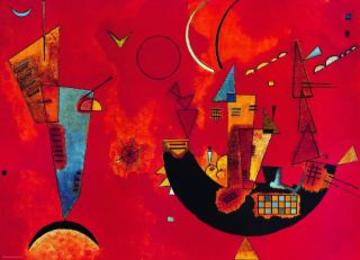TT 2016 Week 0 Updates (1)
If you thought that Hilary term was busy for OCCT, wait until you see what’s lined up for Trinity! We have two amazing linked translation and creative writing workshops; a talk by the esteemed Eric Hayot, and a fascinating seminar on embodied cognition for ‘Our Fiction and Other Mind’ series: and that’s just in the first half of term! We’re also co-hosting events with POMP and the Race and Resistance network, and running our fortnightly discussion groups. In Week 9 of term we’re having a symposium on colour at Trinity college! Learn more about all these events here: http://www.occt.ox.ac.uk/events.
OCCT is also responsible for putting together the programme for Oxford Translation Day. Oxford Translation Day is a celebration of literary translation consisting of workshops and talks around the city, culminating in the award of the Oxford-Weidenfeld Translation Prize. Our programme includes a range of events which are all open to the public. The OTD programme will be released shortly on: http://www.occt.ox.ac.uk/oxford-translation-day-1.
If you feel that there’s a book you would love to review, get in touch with the OCCT Review editors, Dr Eleni Philippou and Dr Dennis Duncan on comparative.criticism@st-annes.ox.ac.uk.
Events
1) Modern Poetry in Translation is celebrating its 50th anniversary. Founded by Ted Hughes and Daniel Weissbort, the magazine has played a unique role over the past fifty years in bringing the best in world poetry to English-language readers.
To mark this important birthday we are hosting two very special study days, at Pembroke College, Cambridge, and The Queen's College, Oxford.
Open to students and the general public, we'll be celebrating and showcasing the history of the magazine through a series of workshops and readings. Join us for the opportunity to work with and hear from leading translators, poets and scholars.
Tickets include:
- Two poetry translation workshops (max 15 participants) with leading translators and scholars
- Two afternoon poetry readings
- A reception with readings to celebrate the launch of the new microsite for MPT No.1
- Lunch, tea and coffee and refreshments during the day
For more information on 50th anniversary activities please see our 50th anniversary page.
These study days are supported by The Queen’s College, Oxford, and Pembroke College, Cambridge, the Polish Cultural Institute, Writers’ Centre Norwich, Cambridge PEN, The Stephen Spender Trust and Bloodaxe Books.
http://www.mptmagazine.com/article/booking-open-translation-study-days-in-april-and-may-2016-79/
2) Reading and rewriting ancient texts in the long eighteenth century: A one-day colloquium
Seminar Room, Corpus Christi College, Oxford
Saturday 14 May 2016
Organizers: Stuart Gillespie & Stephen Harrison
Programme
10:30-11:00 Coffee/Registration
11.00-1:00
Helen Slaney (Oxford): Ancient Geographies Translated as Narratives of Travel
Micha Lazarus (Cambridge): Sublimity by Fiat: New Light on the English Longinus
David Hopkins (Bristol): The Poet as Annotator: Pope’s Observations on his Iliad
1:00-2:00 Lunch
2:00-3:30
Clare Bucknell (Oxford): William Popple’s Works of Horace
Penelope Wilson (Cambridge): ‘Never let me trifle with a book’: Philip Doddridge as Reader of Homer and Virgil
3:30-4:00 Tea
4:00-5:30
Stuart Gillespie (Glasgow): Newly Recovered English Classical Translations, 1600-1800
Philip Hardie (Cambridge): Eighteenth-Century Flights of the Mind
5:30-6:30 Drinks
Cost £15 including lunch, tea/coffee and drinks, payable on the day. Please book in advance with Prof. Stephen Harrison by 1 May 2016: Stephen.harrison@ccc.ox.ac.uk.
Graduate students may attend for £10, Corpus graduate students free.
3) Multilingual Shakespeare Mash-up: It’s easy to mingle when you’re multilingual
8 May 2016, 3-5pm, Anatomy Museum, King’s College London
Free entry
Shakespeare's words form, inform, reform English: nonetheless, we like to see Shakespeare as international, or transnational, and to celebrate the fact that his works are translated and performed in all corners of the earth. Shakespeare’s plays, however, portray the ways language divides, and language excludes. The powerful conquer through language. The plays also revel in the fact that language is as diverse as people, and remind us that all relationships require an effort of understanding – to love another is to learn another’s language, even if each person will always speak with their own accent.
The Multilingual Shakespeare Project began with the aim of creating a Swiss Shakespeare, exploiting the rich linguistic resources and esoteric local traditions of a tiny nation at the heart of Europe. In Switzerland minority languages may be perceived as under threat, but may also mark membership of a club and define and exclude the outsider. In the UK, the idea that a single national language can be a means of social inclusion is hotly debated. The Swiss Stage Bards will build their own Tower of Babel using live performance and multimedia scenes adapted or translated from The Merchant of Venice, Love’s Labour’s Lost, and Henry V: their presentation will explore language in Shakespeare’s plays as a means of connection or division, communication or misunderstanding, accommodation or rejection.
There will be cheese and chocolate, and cows, but no cuckoo clocks. You will be amazed at your own capacity to follow what is going on….
Performers: The Swiss Stage Bards
Director: Professor Elisabeth Dutton, University of Fribourg, Switzerland
Hosted by King’s College London
4) Please follow the link below to the programme for the Samuel Beckett and World Literature international conference, which will be held at the University of Kent, Canterbury on 4-5 May 2016. There's going to be a film screening of Ashish Avikunthak's Kalkimanthankatha as part of the event, followed by a discussion with the cinematographer. For all those interested, registration closes on April 25th.
http://blogs.kent.ac.uk/beckettworldlit/category/conference-programme/
Eleni Philippou



